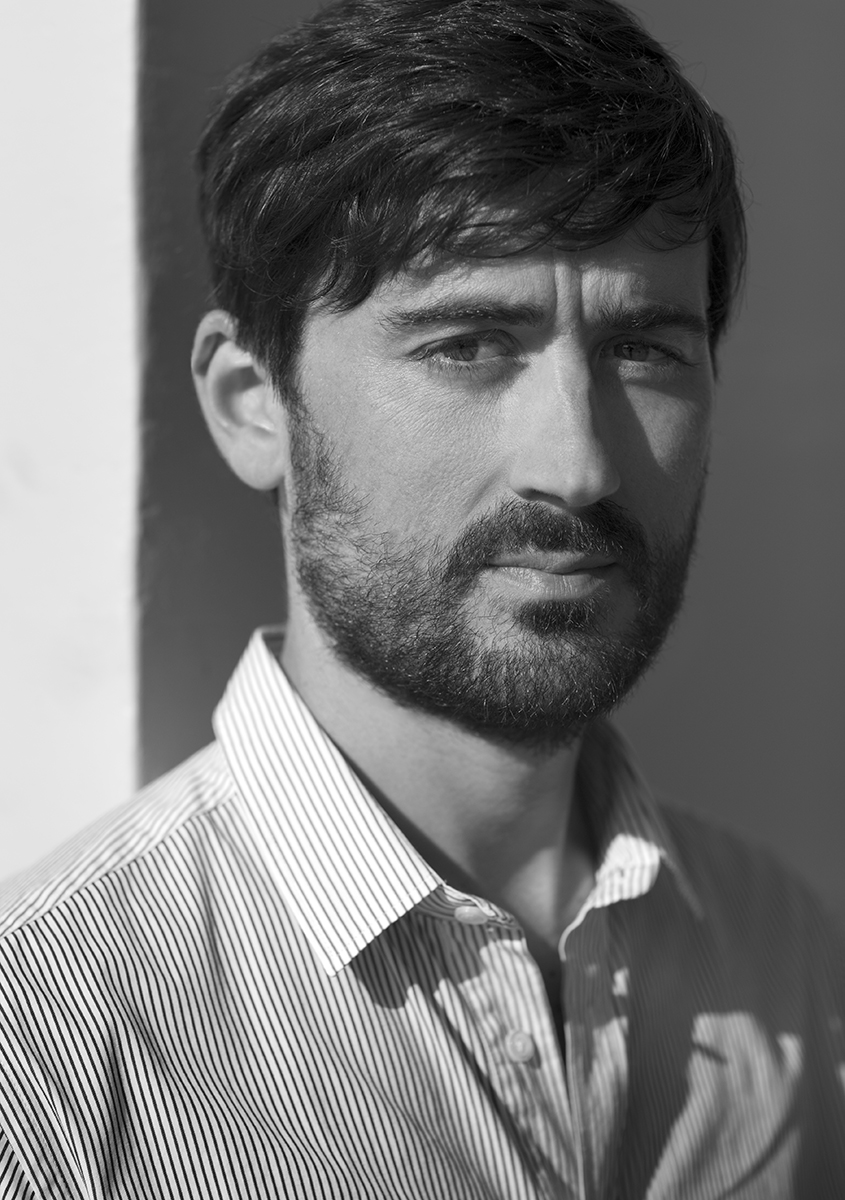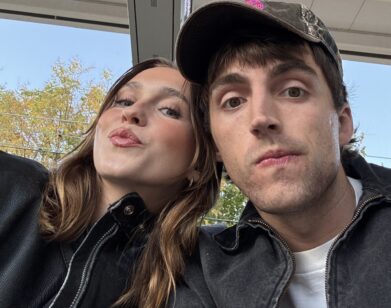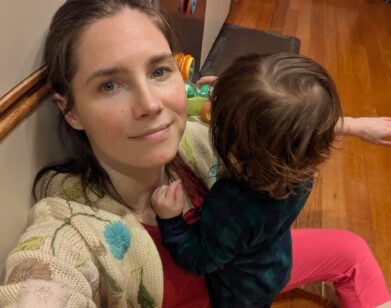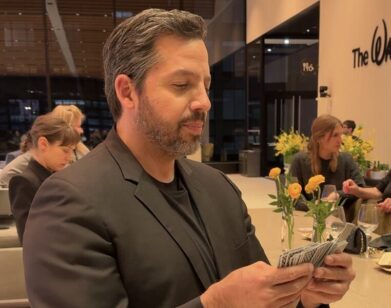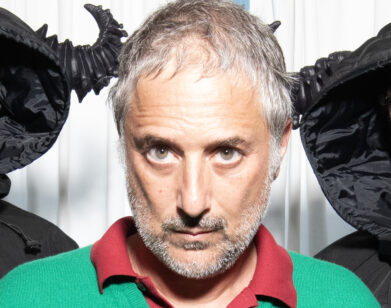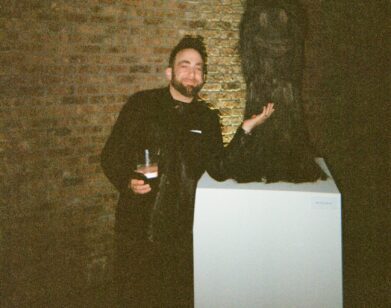Scott Hutchins on AI and SF
I’m still trying to figure out how first-time novelist Scott Hutchins made a story about an accidental computer programmer who communicates with his dead father through a pseudo-sentient mainframe into one of the most humane (not to mention moving and hilarious) stories I’ve read in a long time.
Hutchins’ novel, A Working Theory of Love, out this week from Penguin Press, revolves around Neill Bassett, a young San Franciscan whose doctor father committed suicide several years ago and who is now being asked by an ambitious artificial-intelligence start-up company to use the father’s obsessive diaries—Bassett Senior recorded the most quotidian events and thoughts—to cultivate a human-seeming personality inside a microchip. Neill chats with—and corrects—his own dead father by day on a computer screen, but his personal life is no less weighted in questions of authenticity and actual person-to-person contact. He’s clumsily pursuing a young budding cultist named Rachel, who seems determined to become a fully-wired, emotionally rounded being in a world of one-night stands and occasional text messages. In other words, the book ponders what it means to be human in an age when computers are getting ever closer to mimicking our though patterns, when we are constantly being told by spiritual pop gurus that we are out-of-touch with our own deepest natures.
While I pity the editor at Penguin who had to write the plot summary on Hutchins’ dust jacket, the rewards of reading A Working Theory of Love are many—foremost, a dashing writing style that sums up complex emotional algorithms in exquisitely sharp and disturbingly insightful sentences. The protagonist observes in passing a telling fact about his father: “I stopped calling him Dad when he committed suicide; it seemed too maudlin.” Yes. Yes, that’s it exactly! As honed as it is on Neil and his father issues, A Working Theory of Love also proves to be a creased valentine to the city of San Francisco, which I just happened to visit this past summer as I read the book.
I spoke by phone to the 38-year-old Hutchins about his first novel, and how he opened up AI and found a heart amid all of the circuitry.
CHRISTOPHER BOLLEN: At the opening of A Working Theory of Love, Neill Bassett—in his mid-30s and recently divorced—experiences very palpable alienation in his urban life. Urban alienation is a literary crisis I usually associate with novels set in New York. I’ve always thought San Francisco was a warmer, more communal place. Does Neill’s situation match your own experience of living in San Francisco?
SCOTT HUTCHINS: Just from a literary point of view, I would think of Dashiell Hammett as a writer who has plenty of alienated men set in San Francisco. But, yes, it was from personal experiences—my experience and those of people that I knew. I think dating in San Francisco is pretty challenging. I was in a relationship when I started the book, but I became a bachelor while writing it, and I became interested in that no-man’s-land in a city like San Francisco—being a certain age and being single and living a life that, from the outside, can be seen as dismissible. I wanted to write about what that was like. I wouldn’t say that is strictly autobiographical, but there’s definitely a lot of working from life.
BOLLEN: The part where the protagonist books himself into a youth hostel and pretends to be a tourist just to meet available young women is particularly hilarious. I won’t ask if that comes from a personal experience. Or maybe I should ask so people don’t assume it is.
HUTCHINS: [laughs] It isn’t.
BOLLEN: I think you should receive some sort of award for writing a book with one of the most complex-sounding plotlines imaginable—young man coming to terms with his dead father through a computer program trying to recreate his father’s personality. It’s really impressive how personal and insightful this interaction between the son and the dead father-through-simulated-father is. During the course of writing this book were there any moments where you stepped back and thought, “What am I doing? How is this ever going to fly?” Because it could really have gone horribly wrong.
HUTCHINS: Yes. I thought the entire time, “This is ludicrous and there’s no way I’ll ever get away with this.” So I just kept working on it and working on it, because there was something about those dialogues that were very alive in the writing for me. And the feedback I’ve gotten on that has been good. In fact, in some of the early drafts that I showed to friends, they said, “Well, the part I thought I would never go for is actually the part that is working well.” I think because I knew how ludicrous and challenging it was going to be, I just gave it everything I had.
BOLLEN: What was your research for this book? Did you trail anyone studying artificial intelligence or any rogue programmer out there trying to invent the first thinking machine?
HUTCHINS: First of all, I read more books than you can imagine on all sorts of odd topics, which is something that I love. But I also had a brief conversation with John McCarthy, who was a founding member in the development of artificial intelligence. He passed away last year. I also had lunch a couple of times with a man named Rich Wallace, who is the creator of one of the best talking computers, called ALICE [Artificial Linguistic Internet Computer Entity]. He invented a language that’s called Artificial Intelligence Markup Language, which is sort of similar to HTML. It deals with the problem of recurrence, which involves a computer remembering what was said in line 2 when it is brought up again in line 6 and later in line 12. That’s challenging, because computers can’t really follow along or deal with context. And obviously that’s key to what we understand as a conversation. So for a while, anyone could go online and create their own talking robot based on Wallace’s Markup Language. I did that a few times myself.
BOLLEN: In your book, Neill keeps correcting the program’s responses—helping it with definitions or when it misused a word or phrase. Did you have to do that when you make your own talking robot?
HUTCHINS: It’s a bit like the Dr. Bassett program, where you talk to it and correct it, yes. I also researched the Turing test. In fact, I flew to New York to judge it. There’s this very odd character named Hugh Loebner, who owns a brass works in New Jersey. For some reason, he has decided for the past 25 years to sponsor a Turing test, which is the test Alan Turing came up with to determine if a computer could pass for a thinking human being. Since then, Loebner’s managed to infuriate everyone in the field of artificial intelligence. And this test was held in his apartment in the Upper West Side. So I happened to be a judge because I was visiting for research. All the computers were pretty brilliant in their own way, but there was never a sense that there is really a there there. I talked to Wallace about this. “What if we had a personality to work from?” Wallace’s idea that you could start with the enneagram [a personality model using interconnected personality types]. I don’t know if he’s done any work on that since, but just working with those computers gave me the idea of starting with a fixed personality. Could something more come of it?
BOLLEN: And that’s why the programmers want to use Neill’s father’s personal diaries. There are rather beautiful exchanges of interpretation and misinterpretation when Neill is communicating with the computer program based on his father. It swerves between conversations between father and son and conversations between man and computer. I can imagine as a writer the difficulty of finessing a fictional character that is, essentially, just a facsimile of a human being.
HUTCHINS: I wrote the book completely out of order. So when I came back, I wanted to make sure that there were very clear progressions. I had to make sure the computer was following the logic from A to B to C and not going back to A. But also when I was chatting on these computers during my research, there would often be very funny ways in which the computer would pick the wrong word out of the question and use that as the thing to respond to. That’s the kind of interchange I wanted to mimic.
BOLLEN: There is an interesting parallel between a man who obsessively records his life in journals and a computer storing every piece of information. Did you also research mad diarists? Is that a literary wonder or psychological problem?
HUTCHINS: [laughs] There are people who are even worse. Basically, it’s almost a mental illness. There are people who keep a log of everything that happens to them. NPR interviews one every year. They’ll look at his journal and his journal will say “7:30—had oatmeal. 7:45—was interviewed on NPR.” He’s doing this constantly.
BOLLEN: Do you think of it as a way of maintaining control over their lives? Or is it a way to find the importance in it? I’m almost envious. I’ve started so many journals, and after three entries I tend to give up.
HUTCHINS: I’m like you. I’m a terrible journal-keeper. But I suspect it’s way of imposing order on chaos—perceived chaos. I would say that with Neill’s father’s character, it’s something a little different. I think it’s a way of living out a life as the person he wishes he lived it, to be a character that he’s not quite in real life.
BOLLEN: Do you think an AI researcher would ever really consider using someone’s diaries as a way of implanting a personality in a program?
HUTCHINS: The whole Turing test project in AI is really looked at with a critical eye right now, in part because they’re so far from getting anywhere close to beating it. It’s this dark cloud that hangs over the field. Mainstream scientists have really stopped talking about it, and the people entering this contest, most of them don’t have academic affiliation. Most of them are doing these projects in their free time in their basement. So this is really not a mainstream pursuit at the moment—although it has been in the past. Would they go for it or not? I don’t know.
AI is a big field. I looked into this new branch in it called Affective Computing, which Rosalind Picard at MIT invented. It’s a way that computers could learn to read emotional cues. But when I met artificial intelligence researchers at Stanford, many had never even heard of this branch. So it’s a scenario where one person doesn’t always know what another person is doing. There’s a lot of specialization.
But back to your question. Would it stand up? It probably depends on what they’ve been reading and what they think. I’m sure there’ll be a lot of opinions.
BOLLEN: There is also the character of Neill’s girlfriend, Rachel, who is also trying to “become more human” by entering what is basically an emotional, sexual cult promising liberation. Somehow that fits in to my idea of San Francisco too. You have Silicon Valley nearby, and you also have these spiritual groups offering inner enlightenment.
HUTCHINS: There’s fairness in that. I’ve known some people who’ve gotten involved with self-realization groups and groups that are based around breaking through obstacles. I wouldn’t go as far as to call them a cult. But that’s a common trope out here. I don’t want to over-stereotype my beloved city, but there’s a sense in which many come to San Francisco for self-realization. It creates a population interested in those sorts of things. Obviously there’s a whole spectrum—something as simple as yoga, which is not in any way cult-like, but sometimes attracts people for that reason. And then you can just push the dial to these intentional communities or communes, which exist in the city, and are built around ideas of psychological development. There’s also an earnestness to sex and the way sex is talked about in San Francisco. Clearly people come here to be free, and that’s incredibly important.
BOLLEN: I like what you said about yoga. I think I’m cult-proof simply because I’m so inflexible. San Francisco has a long history as a writer’s city. From City Lights to McSweeney’s. In that way it may be similar to New York. Do you find that kind of writer-infested environment nourishing, or are you immune to it, or does it just lead to a lot of competition?
HUTCHINS: It crosses my mind that there may be too many writers in San Francisco. But I don’t go to those parties. I did work as an editor at The Rumpus for a little while, so I know that crew, and I would go to those readings and would know everybody. But I went to one recently, and I didn’t know anybody. So the baton has been passed on, I think.
BOLLEN: There’s a certain age you get to where you can’t go to parties and actually still be a writer.
HUTCHINS: In general I find it really nourishing, but I’m also not that involved. It’s also a great city for readers. If you look at the San Francisco Chronicle best-selling writers or best-selling books of the Bay Area, you’ll see some of the titles usually at the top of the list, but you’ll also find some really good books-serious, capital-L literature. So there’s a public out here that is deeply interested in books beyond Fifty Shades of Grey. Not to say there is anything wrong with Fifty Shades of Grey. I haven’t read it.
A WORKING THEORY OF LOVE IS OUT NOW.

